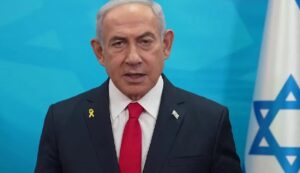Israel PM Benjamin Netanyahu rejects US plan for ceasefire with Hezbollah
The Israeli prime minister, Benjamin Netanyahu, has responded to requests for a ceasefire with Hezbollah sponsored by the United States and France by ordering the Israel Defense Forces to continue fighting “at full power.”
In a statement, the Prime Minister’s Office stated: “The prime minister did not even reply to this U.S.-French proposition. The information on a purported order to defuse the violence in the north is also untrue.”

This morning, the Israel Defense Forces said that they will keep attacking Hezbollah in several parts of Lebanon in an effort to “dismantle and degrade Hezbollah’s capabilities and terrorist infrastructure.”
In order to facilitate talks in the rapidly intensifying confrontation between Israel and Hezbollah, which has resulted in the deaths of over 600 people in Lebanon in recent days, the United States, France, and other allies collectively called for an immediate 21-day truce on Wednesday.
Constructed at the United Nations General Assembly in New York, the joint statement describes the current conflict as “intolerable and presents an unacceptable risk of a broader regional escalation.”
Bezalel Smotrich, Israel’s finance minister, added his voice to the ceasefire suggestions on Thursday by opposing the notion of a 21-day truce between Israel and Hezbollah.
Crucial to Prime Minister Benjamin Netanyahu’s coalition government, Smotrich maintained that Israel could not advance without pursuing its fight against Hezbollah.
“The campaign in the north should end with a single result: crushing Hezbollah and elimination of its ability to harm the residents of the north,” Smotrich said on X.
“The enemy must not be given time to recover from the heavy blows it has suffered and reorganize itself to continue the war after 21 days,” he said.
“Hezbollah’s surrender or war—this is the only way to bring back the residents and security to the north and the country.”
Since Wednesday, when the country’s Health Ministry revealed that 72 more people had died in assaults, Israeli airstrikes have claimed over 630 lives in Lebanon. As a result, there will be emergency talks at this week’s U.N. General Assembly in New York.
The idea for a ceasefire was intended to provide room for diplomatic discussions and lower the possibility of a larger regional war.
Leading the charge were the United States and France, who on Wednesday at the conference asked for an emergency move. Saudi Arabia, Germany, Japan, and the United Arab Emirates all supported the measure.
“We call for an immediate 21-day ceasefire across the Lebanon-Israel border to provide space for diplomacy,” the joint statement said. The declaration underlined how “intolerable” the conflict has become and how seriously it threatens the stability of the area.
The burden of the fighting is falling on Israeli residents in northern Israel and tens of thousands of Lebanese people in the southern districts of Lebanon under Hezbollah control.
As Israel and the terrorist organization Hezbollah, which is supported by Iran, continue to shoot almost every day, there is growing worry that a larger battle may break out between them.
In an effort to promote longer-term peace along the border, the U.S. has been pressuring Israel and Lebanon to approve the ceasefire right away after the U.N. summit.
Senior American sources said that Israel was anticipated to “welcome” the plan and maybe support it when Netanyahu speaks to the U.N. General Assembly later this week.
The heaviest strike Israel has undertaken on its northern neighbor, Lebanon, since the 2006 war, caused the Israeli prime minister to postpone his planned statement on Monday.
Over 41,000 Palestinian fatalities have been reported by Palestinian health officials as a result of Israel’s military’s harsh assault in Gaza. Following the assault on Israel on October 7 by Hamas terrorists, the campaign was started.
In the diplomatic endeavor, President Joe Biden has taken a leading role, advocating for de-escalation across the region.
During his appearance on ABC’s The View, Biden voiced his concern that “an all-out war is possible” but also expressed hope that the Israeli-Hezbollah truce may “fundamentally change the whole region.”
Global support for the ceasefire has been mobilized in large part by U.S. Secretary of State Antony Blinken.
During a meeting with French officials on Monday, Blinken initially presented the idea. Later, he got support from important Middle Eastern figures, such as Saudi Foreign Minister Faisal bin Farhan and Qatari Prime Minister Mohammed bin Abdulrahman Al Thani.
After all of this work, a larger coalition supporting the ceasefire plan was formed, which included members of the industrialized democracies that make up the Group of Seven (G7).
Lebanese Prime Minister Najib Mikati supported the truce before the U.N. Security Council on Wednesday, calling on the council to ensure “the withdrawal of Israel from all occupied Lebanese territories” and calling the fighting a “dirty war.”
Danny Danon, Israel’s ambassador to the United Nations, declared: “It will occur, either before to or after a conflict. We’re hoping it happens sooner.”